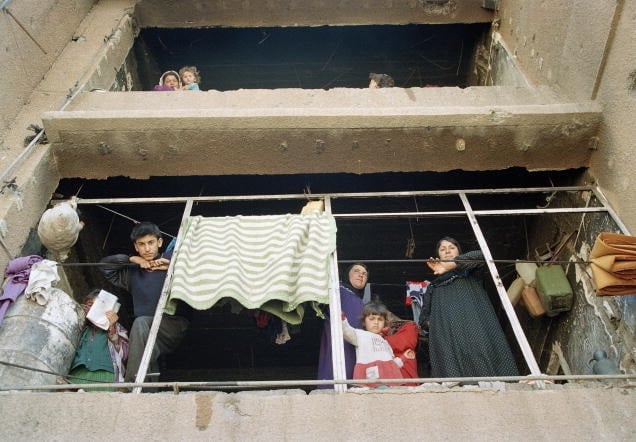Family in Iraq 2003: Flickr
On February 5, dozens of Iraqi protesters gathered in front of the country’s Supreme Juridical Council in Baghdad to protest the ‘honor killing’ of Tiba al-Ali, a 22-year-old woman who was allegedly strangled by her father in her sleep. Her death sparked outrage in Iraq, where women are frequently murdered by male relatives in family disputes. For years women rights groups are demanding legal reforms to protect women against domestic violence and honor killings with little to no effect. Tiba al-Ali was living in Turkey and had a YouTube channel documenting her life there. Al-Ali and her father had an intense dispute when she visited her family in Iraq. One day before she was murdered the local police had intervened to try to reach a settlement between the two.
At the protest, Lina Ali, one of the protesters said “We will keep mobilising because of rising domestic violence and killings of women”. Police in Iraq say domestic violence has increased by 20 percent since the start of pandemic, which pushed millions of Iraqis below the poverty line and increased economic and psychological pressure. Existing gender and social inequalities for women widened during the pandemic and led to an increase in various forms of gender-related violence, especially domestic violence. Aya Majzoub, Amnesty International’s Deputy for the Middle East and North Africa said about the killing: “Until the Iraqi authorities adopt robust legislation to protect women and girls from gender-based violence, we will inevitably continue to witness horrific murders such as that suffered by Tiba al-Ali”.
There are currently no direct national laws protecting women. The Iraqi constitutions prohibits all forms of violence and abuse in the family. Only the Kurdish region has a domestic violence law. Iraqi Penal Code, which applies in both Baghdad and the Kurdish region, criminalizes physical violence but makes no mention of domestic violence. Instead, Article 41 gives a husband the legal right to “punish” his wife, and parents to discipline their children “within the limits prescribed by law or custom”. Also, article 409 reduces murder sentences for men to up to three years who kill or permanently harm their wives or female relatives for “honorable reasons” or because of adultery. There are also no proper shelters for victims of domestic violence. Sometimes victims are placed in women prisons to protect them. In Baghdad, there is one government-run shelter, but it only provides shelter by court order. This requires a police case, something that women want to prevent because of the stigma associated with entering a police station. Also, many women who do go to the police station are urged to participate in ‘mediation’ instead of filing a lawsuit.
Since 2015, the bill for protecting women against domestic violence has been rejected multiple times by the Council of Representatives by numerous parties who argued that it is incompatible with religion and Iraqi culture. They also argued that the bill promotes westerns values, that it would destabilise the Iraq family and it would interfere with private family matters which is contrary to the constitution and Islam. Iraqi presidency presented in 2019 the Anti-Domestic Violence Law, but it has not been adopted yet. In February 2022, an appeal by the Iraqi Women’s League was dismissed to end article 41, the legal justification for a man beating a women. They argued that this justification is unconstitutional. The court states that article 41 determines the right to discipline within the limits established by law and Sharia law. They argued that the organisation’s claim was not based on constitutional grounds and was therefore dismissed.
Heteropatriarchal political parties use culture and religion as justifications for discriminatory laws and provisions. Male community leaders who sustain patriarchal and traditional ideas about the role of women, are still dominating the government body. They use patriarchal interpretations of Islamic law to legitimise their conservative agendas and block reform laws and the introduction of pro-women policies and legalisation. The institutionalisation of religion makes it harder to challenge discriminatory interpretations because they become credible due to the weight of both religion and the state.
Author: Manouk Bronzwaer



